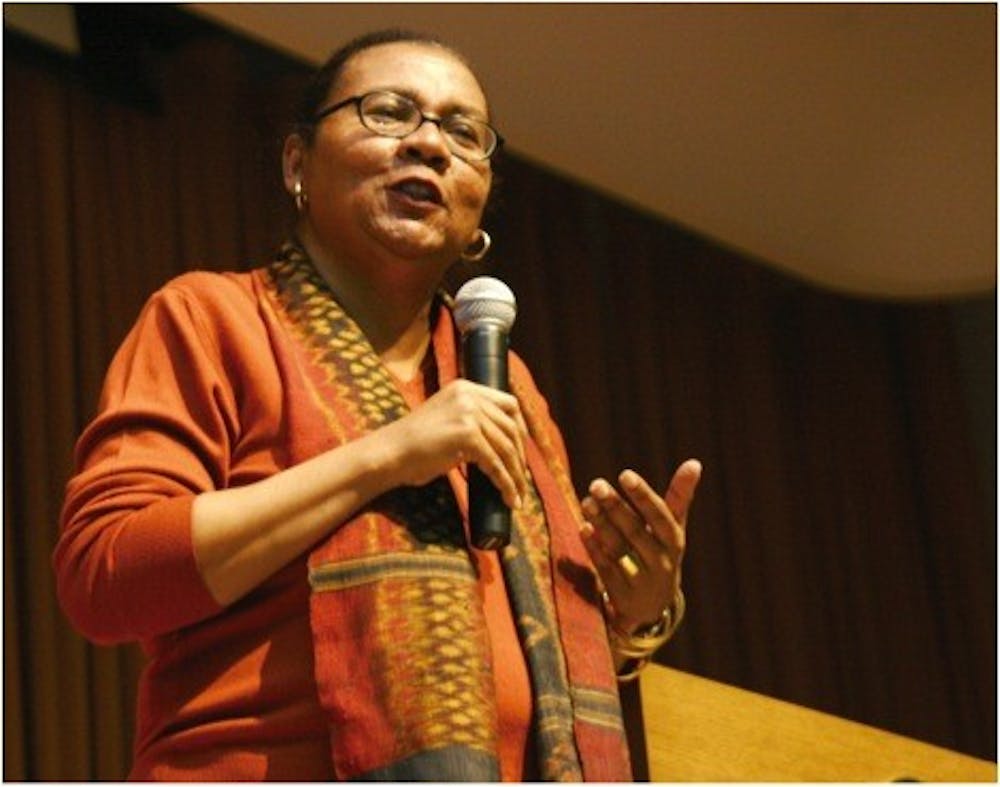How can I properly introduce bell hooks? I’ve found that it’s the people we most look up to that are the hardest to write about, so it makes sense that just the prospect of writing about her makes me want to run far away from my computer and draw more pictures of cats. If you know about bell hooks, then you’ll know what I mean, and if you don’t, then here’s the part where I try to condense her myriad accomplishments into a few sentences for you.
bell hooks (that’s right, she doesn’t capitalize her name) is a writer, feminist` and social activist whose body of work includes more than 30 books, one of which was written before she even finished her undergraduate degree. Her thoughts on the interconnectivity of race, class and gender are life changing, and have helped to shift the dialogue surrounding all three to a more inclusive and productive place. The particular irony of her sojourn to Arizona as a distinguished lecturer, considering her book Feminism is for Everybody’s inclusion in the deeply misguided Tucson book ban, was not lost on hooks. When asked how she felt the ban would impact the future for people of color, hooks didn’t mince words: “Luckily,” she said, “we’re not dependent on Arizona.”
So, what brought hooks to Arizona despite all of this? On Feb. 13, hooks delivered a keynote address on race and gender for ASU’s Project Humanities, an initiative that brings together students, faculty, staff and community members in an effort to discover “the place of truth as we navigate our lives,” in the words of Project Humanities coordinator Dr. Neal Lester. This makes bell hooks a fitting keynote speaker -- it’s hard to imagine someone more devoted to seeking out truth.
hooks’ take on the Tucson book ban similarly emphasizes the importance of truth; its danger, according to hooks, lies in the implication that we can take away the trauma of oppressed groups and minorities by whitewashing history. In fact, this was a theme that carried over into hooks’ second talk on Feb. 14, this time on The Help, the movie and the book. hooks made it clear that this impulse to whitewash history in an effort to erase previous traumas she spoke of earlier is just as much at play in The Help, if not in more subtle and dangerous ways.
When people talk critically about any wildly popular movie or work of fiction, their first instinct is usually to tread lightly -- all too often this is what keeps any viewpoint other than the dominant one from taking shape. hooks had none of this. Instead, she jumped right in and called out The Help’s author Katherine Stockett for propagating the myth that the connections between oppressor and oppressed were defined by love and affection in her novel, calling it a blatant lie. The power of fiction, she insisted, is that it can “affect alternative and transformative visions beyond overused stereotypes and convention,” neither of which The Help does.
Instead of offering meaningful fictional accounts of the relationships between white women and black domestics in the ‘60s, The Help “glorifies the exploited and abused black domestic as ideally desirable,” and creates a world where “all white women lack courage, character, and emotional intelligence.” One solution? Let marginalized groups tell their own stories. Once we realize that “facing reality helps us to heal and grow,” said hooks, maybe we’ll start creating space for honest, and even painful stories to be told. hooks’ final piece of advice? To teach love. “Love,” she said, “ends domination and builds self-esteem.” Its power to compel people to change is a story that’s not told often enough. Ultimately, hooks was emphatic that we should not let these false narratives -- or attempts to silence honest ones -- discourage us: “Our hope lies not in what white supremacy does, but in what people will do for truth.”
Email me at jlpruett@asu.edu.





